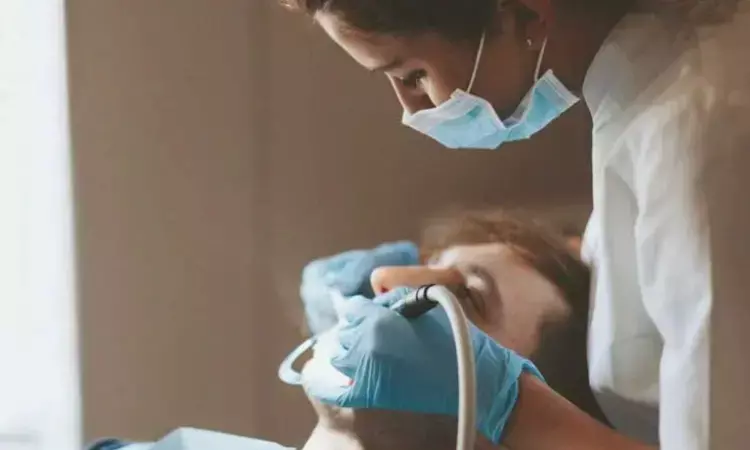- Home
- Medical news & Guidelines
- Anesthesiology
- Cardiology and CTVS
- Critical Care
- Dentistry
- Dermatology
- Diabetes and Endocrinology
- ENT
- Gastroenterology
- Medicine
- Nephrology
- Neurology
- Obstretics-Gynaecology
- Oncology
- Ophthalmology
- Orthopaedics
- Pediatrics-Neonatology
- Psychiatry
- Pulmonology
- Radiology
- Surgery
- Urology
- Laboratory Medicine
- Diet
- Nursing
- Paramedical
- Physiotherapy
- Health news
- Fact Check
- Bone Health Fact Check
- Brain Health Fact Check
- Cancer Related Fact Check
- Child Care Fact Check
- Dental and oral health fact check
- Diabetes and metabolic health fact check
- Diet and Nutrition Fact Check
- Eye and ENT Care Fact Check
- Fitness fact check
- Gut health fact check
- Heart health fact check
- Kidney health fact check
- Medical education fact check
- Men's health fact check
- Respiratory fact check
- Skin and hair care fact check
- Vaccine and Immunization fact check
- Women's health fact check
- AYUSH
- State News
- Andaman and Nicobar Islands
- Andhra Pradesh
- Arunachal Pradesh
- Assam
- Bihar
- Chandigarh
- Chattisgarh
- Dadra and Nagar Haveli
- Daman and Diu
- Delhi
- Goa
- Gujarat
- Haryana
- Himachal Pradesh
- Jammu & Kashmir
- Jharkhand
- Karnataka
- Kerala
- Ladakh
- Lakshadweep
- Madhya Pradesh
- Maharashtra
- Manipur
- Meghalaya
- Mizoram
- Nagaland
- Odisha
- Puducherry
- Punjab
- Rajasthan
- Sikkim
- Tamil Nadu
- Telangana
- Tripura
- Uttar Pradesh
- Uttrakhand
- West Bengal
- Medical Education
- Industry
Deep sedation linked to subsequent delusional memories in acute COVID-19 survivors

Portugal: Long-term psychological, physical, and cognitive impairments are increasingly recognized sequelae of ICU admission in critical illness survivors. New research published in the Journal of Intensive Care Medicine has described the effects of deep sedation on subsequent delusional memories in acute COVID-19 survivors. It adds to the increasing evidence that lighter sedation strategies should be used whenever possible.
The authors wrote, "the study contributes to a better understanding of the potential adverse effects of deep sedation in survivors of COVID-19, indicating an independent, significant association with the incidence of delusional recalls."
Critical care survivors sustain several sequelae following admission to intensive care medicine, and the COVID-19 (Coronavirus Disease 2019) pandemic has added further challenges. ICM memories play a significant role, and delusional memories are associated with poor outcomes post-discharge, including a delayed return to work and sleep problems. Deep sedation has been linked with a higher risk of perceiving delusional memories, bringing a move toward lighter sedation. However, reports on post-ICM memories in COVID-19 are limited, and the influence of deep sedation has not been defined completely.
Against the above background, A. Braga and colleagues from Portugal aimed to evaluate ICM-memory recall in COVID-19 survivors and their relation with deep sedation.
The study evaluated adult COVID-19 ICM survivors admitted to a Portuguese University Hospital between 2020 and 2021 1 to 2 months post-discharge using the "ICU Memory Tool" to assess emotional, real, and delusional memories.
The authors reported the following findings:
- The study included 132 patients (67% male; median age = 62 years, Simplified Acute Physiology Score [SAPS]-II = 35, Acute Physiology and Chronic Health Evaluation [APACHE]-II = 15, ICM stay = nine days).
- Approximately 42% received deep sedation (median duration = 19 days).
- Most participants reported real (87%) and emotional (77%) recalls, with lesser delusional memories (36.4%).
- Deeply sedated patients reported significantly fewer real memories (78.6% vs 93.4%) and increased delusional memories (60.7% vs 18.4%), with no difference in emotional memories (75% vs 80.4%).
- In multivariate analysis, deep sedation had a significant, independent association with delusional memories, increasing their likelihood by approximately 6 (OR = 6.274) without influencing real or emotional memories.
The study describes the deep sedation effects on subsequent delusional memories and adds to the increasing evidence that lighter sedation strategies should be employed whenever possible.
"Although further studies are needed to support these findings, they suggest that strategies to minimize sedation should be favoured, aiming to improve long-term recovery," the researchers concluded.
Reference:
Braga A, Martins S, Ferreira AR, et al. Influence of Deep Sedation in Intensive Care Medicine Memories of Critical COVID-19 Survivors. Journal of Intensive Care Medicine. 2023;0(0). doi:10.1177/08850666231156782
Dr Kamal Kant Kohli-MBBS, DTCD- a chest specialist with more than 30 years of practice and a flair for writing clinical articles, Dr Kamal Kant Kohli joined Medical Dialogues as a Chief Editor of Medical News. Besides writing articles, as an editor, he proofreads and verifies all the medical content published on Medical Dialogues including those coming from journals, studies,medical conferences,guidelines etc. Email: drkohli@medicaldialogues.in. Contact no. 011-43720751


